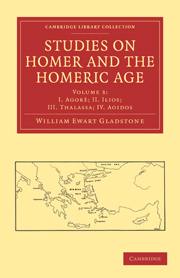Book contents
- Frontmatter
- ADVERTISEMENT
- Contents
- I AGORÈ OR THE POLITIES OF THE HOMERIC AGE
- II ILIOS
- III THALASSA
- EXCURSUS I
- EXCURSUS II
- IV AOIDOS
- SECT. I On the Plot of the Iliad
- SECT. II The Sense of Beauty in Homer: human, animal, and inanimate
- SECT. III Homer's perception and use of Number
- SECT. IV Homer's Perceptions and Use of Colour
- SECT. V Homer and some of his Successors in Epic Poetry: in particular, Virgil and Tasso
- SECT. VI Some principal Homeric Characters in Troy. Rector: Helen: Paris
- SECT. VII The declension of the great Homeric Characters in the later Tradition
- Plate section
SECT. VII - The declension of the great Homeric Characters in the later Tradition
Published online by Cambridge University Press: 05 October 2010
- Frontmatter
- ADVERTISEMENT
- Contents
- I AGORÈ OR THE POLITIES OF THE HOMERIC AGE
- II ILIOS
- III THALASSA
- EXCURSUS I
- EXCURSUS II
- IV AOIDOS
- SECT. I On the Plot of the Iliad
- SECT. II The Sense of Beauty in Homer: human, animal, and inanimate
- SECT. III Homer's perception and use of Number
- SECT. IV Homer's Perceptions and Use of Colour
- SECT. V Homer and some of his Successors in Epic Poetry: in particular, Virgil and Tasso
- SECT. VI Some principal Homeric Characters in Troy. Rector: Helen: Paris
- SECT. VII The declension of the great Homeric Characters in the later Tradition
- Plate section
Summary
One legitimate mode of measuring the true greatness of Homer is, by observing what has become of the materials and instruments he worked with, upon their passing into other hands. Acting on this principle, let us now pass on to consider the murderous maltreatment, which the most remarkable of all the Homeric characters have had to endure in the later tradition ; partly, as I have already observed, from general, and partly from special causes. On the more general influence of this kind I have already touched. Among the special causes, we should place the declension in the fundamental ideas of morals and of politics between the time of Homer and the historic age. With this we may reckon one which, though it may appear to be technical, must, in all likelihood, have been most important, namely, the physical necessities imposed by the fixed conditions of dramatic representation among the Greeksb. Their theatres were constructed on a scale, which may be called colossal as compared with ours. Both polity and religion entered into the institution of the stage. The intense nationality of their life required a similar character in their plays, and likewise in the places where they were to be represented. Not therefore a particular company of auditors, but rather the whole public of the city, where the representation took place, was to be accommodated.
- Type
- Chapter
- Information
- Studies on Homer and the Homeric Age , pp. 590 - 616Publisher: Cambridge University PressPrint publication year: 2010First published in: 1858



